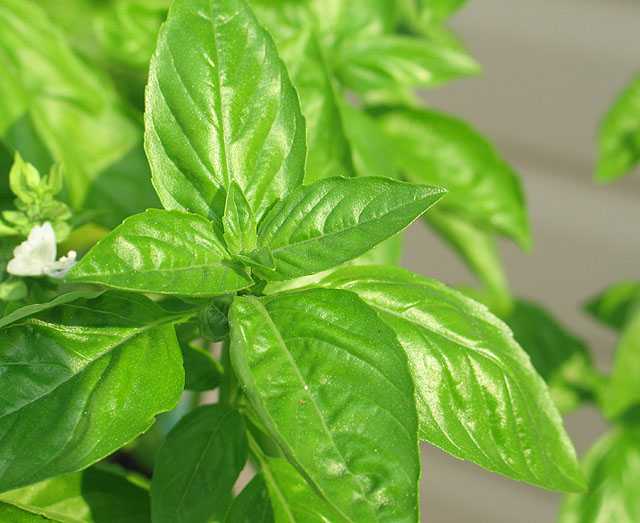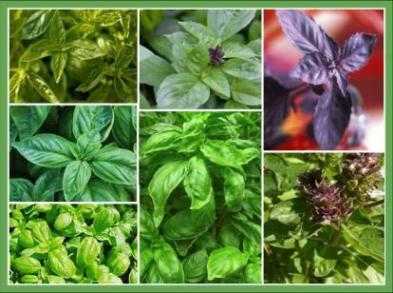Summer Fragrance
Summer smells of the ocean and swimming pool and suntan lotion. It carries the fragrance of ripe fruit – melon, figs, grapes, overripe peaches, and more. In our packing house, summer has a very distinct aroma of basil. When the basil-laden boxes stand in the packing house, it is hard to ignore the heady scent wafting above that instantly spurs taste buds into fantasizing on pesto. After some years in which we grew basil and were burned by a host of leaf
blights out to attack and destroy any green leaf in the vicinity, we took a break for a few years. Over the past two years we began growing basil again, but this time more carefully, in smaller beds. This is why it only graces your boxes from time to time. Today, basil is the aromatic star of this week’s Newsletter.

Basil is an annual plant. In wintertime, it wilts from the cold. Sometimes it can survive the winter if it happens to be a protected indoor plant. Basil is quite common in such warm areas of the world as Asia, Africa, Southern Europe, and California. In Israel, basil does not grow wild, but is very common as a cultured growth in nurseries, where it grows easily so long as it receives at least six hours of sun each day.
There are various explanations as to its name. Perhaps basil is named after the basilica, an elongated church where lots of basil was grown in its nurseries. Perhaps it comes from the word Basilus, Greek for “king,” a title perhaps earned due to its great medicinal properties. In Hebrew and Arabic, it is Rechan, in praise of its strong fragrance.
Folktales attribute the name to a menacing dragon named Basilia that anyone who set eyes on died a strange death, prevented only by a magic basil potion. To this day, basil is known to be a proven remedy against pesky pests (a tad smaller than dragons….) which is why in Italy and France it is grown on windowsills. An opposing belief held that basil attracts scorpions and their sting as well, which is why it was customary to apply a basil leaf compress to an area in the body stung by a poisonous insect in order to draw the venom from the sting. Basil is planted in combined vegetable gardens in order to attract useful bugs and repel flies and mosquitos. Planting basil alongside tomatoes and asparagus actually improves their flavor!
Basil also acts as a secret partner in romance. When a Sicilian woman removes the basil plant from her windowsill, it is a sign to her lover that he may climb right up to her room. But it also assists love in other ways: in Southern Italy, girls would don a garland of basil in their hair to signify their innocence and attract beaus. There, basil is actually called Bacia Nicola (Kiss me, Nicholas). A Romantic Italian man wishing to display his love would wear a sprig of basil in his lapel. In India, it is a talisman warding off evil from a couple’s fertility, which is why Indian women cultivate basil around their homes and temples.
The Jews of Morocco, Yemen, Algeria and Tunisia use basil plants for their fragrance in the blessing over spices at the Havdala ceremony marking the end of the Sabbath. Basil comes in so many different varieties that I can’t even begin to name them. Colors vary from deep green to deep purple, leaves are both serrated and smooth, and the taste fluctuates as well.

In folk medicine, basil tea is used to treat stomach ailments, and basil abstract is beneficial for skin diseases. A blend of various herbs and basil is prescribed for insomnia sufferers, and eating basil seeds along with the leaves help strengthen the heart. The etheric oil found in basil leaves holds many antibacterial, antiseptic and antifungal virtues. It contains linalool, methyl chavicol, and eugenol which encourage perspiration and healthy abdominal function, treat respiratory diseases and encourage lactation for nursing mothers. Basil also contains vitamins A and C.
Basil tea (8 leaves to one cup of boiling water) eases a cough, soothes gassy intestines, relieves painful gums and menstrual cramps and keeps blood pressure balanced. It also lulls to bed those who seek a good night’s sleep.
Tips
- Basil leaves can be preserved in two ways: wrapped in a thin towel and placed in a plastic bag in the refrigerator (just as you would do with lettuce, celery, Swiss chard and other greens) or placed in a vase with water (like you would do with other herbs, mint for example.) If your kitchen is naturally warm, we recommend covering this water vessel with plastic wrap and refrigerating.
- If your recipe calls for dry herbs, they can certainly be replaced with fresh herbs. Just increase the quantity by three. The dish will be all the more robust and aromatic.
This year we improved our basil crop. In the process, we learned it should be cut low in order to allow it to renew itself from the base of the stem, thus keeping “forever young,” preventing fungus and other diseases from taking advantage of weakness in its aging parts. We grow basil in between our nurseries, covering it with a shade net. This way it enjoys protection of two surrounding nurseries like two angels guarding it on either side.
So together with our nice basil, we wish you all wonderful, fragrant, safe days of summer, full of love and good health. And in keeping with our tradition, we wish our Chubeza staff’s new first graders – Talia, Immanuel, Yoav, and Tama – lots of luck and health, safety and security in their new path. May you always learn with happiness, curiosity and excitement. We love you!
Wishing you a good week and luck with the new schoolyear, or anywhere else you find yourselves in the School of Life,
Alon, Bat Ami, Dror, Yochai and the entire Chubeza team
_______________________________________________
WHAT’S IN THIS WEEK’S BOXES?
Monday: Leeks/scallions, coriander/parsley, tomatoes, Thai lubia/lubia, cherry tomatoes, eggplant, Provence/Tripoli pumpkin slice, New Zealand spinach/Swiss chard/basil, cucumbers/bell peppers, popcorn, onions.
Large box, in addition: Potatoes, okra, lettuce
Wednesday: Leeks/scallions, coriander/parsley/dill, tomatoes, cherry tomatoes, eggplant, Tripoli pumpkin slice, New Zealand spinach/Swiss chard, cucumbers/potatoes, popcorn, onions. Small boxes: Thai lubia/lubia
Large box, in addition: peppers, okra/corn, Thai lubia/lubia, lettuce/carrots.
And there’s more! You can add to your basket a wide, delectable range of additional products from fine small producers: flour, fruits, honey, dates, almonds, garbanzo beans, crackers, probiotic foods, dried fruits and leathers, olive oil, bakery products, apple juice, cider and jams and goat dairy too! You can learn more about each producer on the Chubeza website. On our order system there’s a detailed listing of the products and their cost, you can make an order online now
